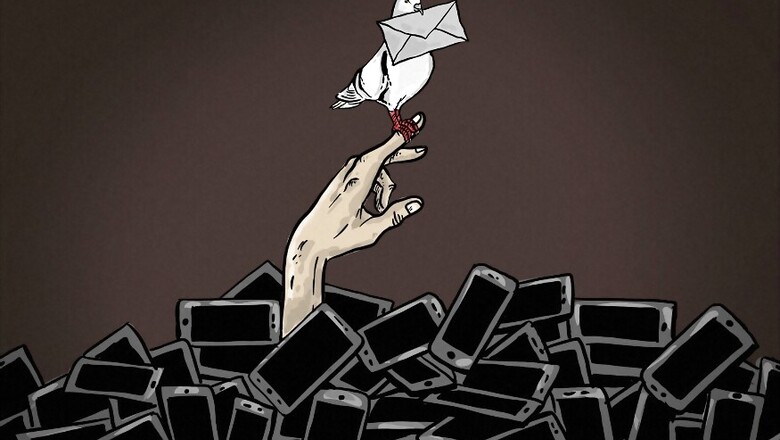
views
New Delhi: People's Daily, the official newspaper of the Central Committee of the Communist Party of China, cited India’s example to justify Internet shutdowns. "India recently ordered a shutdown of the Internet... to control protests over the controversial new Citizenship Amendment Bill. It means that shutting down the Internet in a state of emergency should be standard practice for sovereign countries,” the paper said.
In recent times, India has had the dubious distinction of being the country that saw the maximum number of Internet disruptions in the whole world. In fact, India had more shutdowns than Pakistan, Iraq, Syria, Turkey and the Democratic Republic of Congo.
Thus, the Gauhati High Court’s order asking for the immediate restoration of Internet in Assam is no music to either the Chinese government's ears, or India’s. But, for the Internet community of India, it is a landmark judgment that can go a long way in setting straight the process of Internet blackouts in the country.
The order by the bench of Chief Justice Ajai Lamba and Justice Achintya Malla Bujor Barua said, “No material is placed by the State to demonstrate and satisfy this Court that there exists, as on date, disruptions on the life of the citizens of the State with incidents of violence or deteriorating law and order situation, which would not permit relaxation of mobile Internet services."
Thanks to the order, Internet was restored in Assam on Friday morning, nine days after the state government issued a notification suspending it.
The order also went on to state that with “the advancement of science and technology, mobile Internet services now play a major role in the daily walks of life — so much so, the shutdown of the mobile Internet service virtually amounts to bringing life to a grinding halt."
Calling it a rather balanced order, Delhi-based constitutional lawyer Gautam Bhatia says, "The High Court accepts the premise that on certain occasions, you may temporarily need to suspend the Internet to avoid incitement of violence. But the judgment says two important things — first, that the state has failed to place on record exactly how has the Internet has been used to fuel violence. And second, that there has been no recorded incidence of violence that was triggered by the Internet. Thus, the government has failed to discharge its burden justifying the restriction on constitutional rights."
Bhatia even drew a parallel to a similar order that was recently passed in Hong Kong. While considering a law that prohibited the wearing of face masks in public protests, the Hong Kong administration argued that the protesters were using face masks to indulge in violent activities. But, the court struck down the law that prohibited face masks, citing, among other reasons, the fact that there has been no evidence to show that preventing face masks would play any role in stopping violence.
This order is the second of its kind, where the importance of the Internet in everyday life is underlined in the judgment. In September this year, while ordering a college principal to re-admit a student who was expelled from the hostel for using her mobile phone beyond stipulated hours, Justice PV Asha of the Kerala High Court had observed, "When the Human Rights Council of the United Nations has found that the right of access to Internet is a fundamental freedom and a tool to ensure right to education, a rule or instruction which impairs the said right of the students cannot be permitted to stand in the eye of Law."
That said, the Gauhati High Court order did not rule out the need for such shutdowns in the future.
The interim order points out, "This is not to say that shutdown or suspension of service has to be viewed as an anathema. In given and specific situations, law permits suspension. But, would it be allowed to continue when the present situation do not justify its continuance; when the situation that prevailed on the date of issuance of the initial Notification is not shown to subsist as on date; when there has been an apparent shift to a state of normalcy on the lives of the citizens."
The dependency on Internet for a deemed state of normalcy is what makes the issue even more pivotal. Nakul Nayak, in his research paper The legal disconnect: An analysis of India’s Internet Shutdown Laws, points out, "Internet shutdowns have become increasingly commonplace around the world. Between mid-2015 to mid-2016, over 19 countries suspended Internet access. That number increased to more than 30 in 2017. Notable international examples include the Egyptian Government cutting Internet services in its entire country for over four days, while China doing the same in its Xinjiang province for over 10 months. However, it is India that has the dubious distinction of witnessing the most number of shutdowns in the world."
Nayak’s research paper has also pointed out losses suffered by the economy in times of shutdown. In 2016, a Brookings report pegged Indian economic losses due to shutdowns at $968 million — the highest in the world. The Indian Council for Research on International Economic Relations (ICRIER), in its recent report, measured the cost of Internet shutdowns in India at $3.04 billion between 2012 and 2017. In Assam, 12,000 drivers and car owners who drive for app-based taxi services like Ola and Uber had threatened to commit suicide, as no mobile Internet meant zero revenue for them.
Internet shutdowns in India are regulated by the dedicated rules under the Telegraph Act. The Temporary Suspension of Telecom Services (Public Emergency or Public Safety) Rules, 2017 gives direct and express power for competent authorities to direct Internet shutdowns.
Thus, as Nayak points out, the rule to suspend Internet is completely handled by the government with no representations of the most affected stakeholders — ordinary citizens, the press, businesses and the civil society.













Comments
0 comment